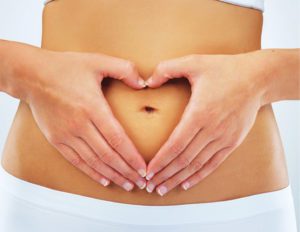By Svetlana Kogan, M.D.


The truth is that our gut has a mind if its own. It is truly our second brain. There are several reasons for that. On the molecular level, there are more receptors for serotonin – a happiness neurotransmitter – in the gut, than in the brain. On a quantum level, there are memories being recorded as electromagnetic imprints in our gut. If you doubt this fact, just talk to any organ recipient and they will tell you that they often have memories of things that never happened to them but did happen to the deceased organ donors. Now, because our organs store memories, which consist of thoughts and experiences coupled with emotions, we effectively have a second mind within our physical body, populated with this information.
You will often hear people say: “I know this with my gut”. And it is true. Any stimulus you are exposed to, like the news on TV for example, is then instantly matched through a huge database of associative memories – the gut then releases the neuro-hormones coupled with that memory. For example, if you lost someone in 9/11 – the overwhelming emotion of grief has been registered with your gut. The fear for your loved ones while listening to the anxiety-provoking statistics on TV today – will trigger the very peptide cascade which made you ‘feel it in your gut’ back in 2001. This vicious cycle will continue until you take action. What can you do?
First of all, avoidance of the negative information from TV and internet is important. Remember: they exist to sell you bad news. Instead, increase your exposure to ‘feel good’ experiences like Nature walks and day trips. Thankfully, Collier County abounds with parks, beaches and nature trails to make this an easy fit.
Take probiotics preventively. Our gut does not just have a mind of its own – it also has its own immune system. We are home to trillions of bacteria, fungi, viruses, and even parasites – collectively known as a Microbiome. Each person’s Microbiome is determined not only by their genetic blueprint, but also by the food they are eating, the stress they are exposed to, and the environmental pollution that surrounds them. Most of the “citizens” of this Microbiome reside in our large and small intestine, but some live on the skin and even other parts of the body. When this intricate system is ideally balanced, every player has a purpose.
The job of the Microbiome is to maintain healthy digestion, immunity, neurologic function, and skin health, respiratory, and even reproductive and urinary functions. Unfortunately, the end of the 20th century has been marked by antibiotics being overprescribed to the majority of patients in the western world. As a result, most of us have emerged with our good bacteria being exterminated as a collateral damage in pursuit of the virulent bacteria.
While it is very important to address psychosocial factors like anxiety and stress we have discussed above, a recommendation for a good probiotic is often useful. Truth be known, probiotics are not just repopulating the gut. They also interact with the immune cells, digested food molecules, and other existing Microbiome bacteria – and this intricate cooperation is what truly boosts our homeostasis. Among some exciting scientific breakthroughs in this field is the hope that soon engineered probiotics will enable people to retain more nutrients from the foods they are eating.
Here is a tip for picking out the most appropriate probiotic formula for your nervous gut: If you are trying to improve digestive function, combat excess gas, or alleviate abdominal cramping, go for the formula that has S.boulardii, B.lactis, and L.plantarum, and L.acidophilus probiotic strains built into it. And even if your probiotic product does not officially require refrigeration – it is prudent to keep it in the dark and cool place, to avoid spoilage. Because probiotic manufacturing is not regulated by FDA, you should always discuss using your Microbiome needs with your physician.
If, despite your best efforts, you have still come down with nervous stomach cramps – drink some warm peppermint tea – it has an antispasmodic effect on the gut. Eating dark chocolate may offer a mild relief. A good rule of thumb is that quick fixes do not work to fix the root of the problem with your nervous gut. Try implementing meaningful lifestyle changes as discussed above, coupled with meditative visualizations, deep breathing, and restorative yoga. All of these holistic modalities can be very helpful in drug-free restoration of gut homeostasis.
Svetlana Kogan, M.D. is a Board Certified Medical Doctor with 20 years of experience. She has appeared as a health expert on FOX, ABC, CBS, and NBC prime time TV, and has authored hundreds of publications for internet and print. She moved her Concierge Internal Medicine practice from Manhattan NYC to Naples, where her focus is on fusing traditional medicine with holistic approach to illness and prevention.
720 Fifth Ave S, Unit 209
Naples , FL 34102
Phone: (239) 676-6883
www.customlongevity.com
 Southwest Florida's Health and Wellness Magazine Health and Wellness Articles
Southwest Florida's Health and Wellness Magazine Health and Wellness Articles

